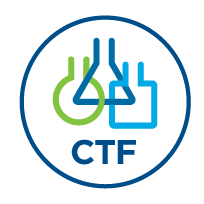NF refers to a group of genetic conditions that cause tumors to grow on nerves throughout the body. NF includes neurofibromatosis type 1 (NF1) and all types of schwannomatosis (SWN), including NF2-related schwannomatosis (NF2-SWN), formerly known as neurofibromatosis type 2, or NF2. NF impacts everyone differently and may lead to blindness, deafness, bone abnormalities, disfigurement, learning challenges, disabling pain, or cancer.
NF is becoming more visible in mainstream culture through various forms of media and storytelling. This increased representation raises awareness about NF and helps foster greater understanding within society. The Children’s Tumor Foundation is here to provide accurate information, support, and resources for individuals living with NF and their families.
"A Different Man"
On September 20, 2024 the film A Different Man, directed by Aaron Schimberg, was released bringing attention to neurofibromatosis type 1 (NF1).
The lead character Edward, played by Sebastian Stan (best known for his role as James Buchanan “Bucky” Barnes in Marvel’s The Winter Soldier) is a man with a facial difference who is asked to join an “experimental drug trial that could heal you.”
The film also stars Adam Pearson, an actor who has neurofibromatosis type 1 in real-life. Pearson is also known for his role in Under the Skin, (the title has nothing to do with NF). Pearson uses his platform as an actor to raise awareness about NF and advocate for those affected by it.
The film never actually mentions the words “NF” or “neurofibromatosis” however, the media reviews have made mention of NF1. While the film has drawn some positive critical attention for its quirky, arthouse style, its dark, disturbing content may not align with audience expectations, particularly within the NF community.
The Children’s Tumor Foundation has more about the movie in a blog post to help you distinguish between Hollywood’s portrayal and the reality of NF.


Orrin Evans and The Captain Black Big Band GRAMMY® Nomination
Orrin Evans and The Captain Black Big Band received a GRAMMY® nomination for a for their album Walk a Mile in My Shoe in 2025. Nominated for Best Large Jazz Ensemble Album, this honor is a remarkable milestone in Evans’ long and illustrious career as a pianist, bandleader, and composer. What makes this recognition especially meaningful to the NF community is that Walk a Mile in My Shoe reflects Evans’ deeply personal journey living with neurofibromatosis type 1 (NF1). Read more in CTF’s blog post celebrating this nomination.

"Soundtrack of Silence: Love, Loss, and a Playlist for Life"
Matt Hay’s book, Soundtrack of Silence: Love, Loss, and a Playlist for Life, delves into his deeply personal journey living with NF2-related schwannomatosis, a condition that caused him to gradually lose his hearing. In this memoir, he describes how he created a mental playlist of songs to preserve key moments from his life before his hearing was completely gone. His story was first shared through a moving NPR interview and later garnered significant attention, leading Paramount Pictures and actor Channing Tatum to option the film rights. The adaptation is currently in development bringing Matt’s inspiring message of perseverance and hope to a broader audience.
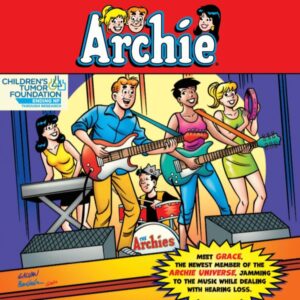
"Archie" Comics
In 2022, Archie Comics and the Children’s Tumor Foundation partnered to introduce Grace Alondra in ARCHIE JUMBO COMICS DIGEST #329, marking the first time a character with hearing loss associated with NF2-related schwannomatosis (NF2-SWN) has appeared in a major publisher’s comic book. Grace debuted in an eight-page short titled “Sounds Like Music.”
Scripted Television Series
Bones
In 2013, the FOX television show Bones aired an episode called “The Doll in the Derby” featuring a subplot about neurofibromatosis type 1. This storyline was inspired by the personal experience of Michael Peterson, a writer and producer for the show, whose daughter Natalie was diagnosed with NF at six months old after he noticed a bowing in her left leg. Peterson spearheaded the initiative to bring awareness to NF through the episode.
The Good Doctor
In The Good Doctor season 2, episode 17, a patient named Kenny is diagnosed with a neurofibroma (a type of tumor that forms bumps on along the nerves). The episode focuses on the challenges of surgically removing the large tumor. While the surgery is ultimately successful, the depiction of the procedure seemed overly simplified, raising questions about its accuracy in portraying the complexities of treating such cases.
Scream Queens
In Scream Queens season 2, episode 2, the depiction of NF1 was highly fictionalized and inaccurate. The portrayal included a wildly exaggerated and fake treatment, further misrepresenting the realities of living with NF1 and leaving viewers with a distorted understanding of this complex disorder.

"Dr Pimple Popper" TV Show
Dr. Pimple Popper is a reality TV show on TLC that follows Dr. Sandra Lee, a dermatologist and cosmetic surgeon, as she treats patients with various skin conditions. The show features Dr. Lee performing extractions of cysts, lipomas, and other skin growths. In several episodes, she has treated patients with cuteanous neurofibromas (cNF) due to NF1. Dr. Lee provides both medical care and personal support to her patients, highlighting the transformation and relief they experience from these procedures.
What are cutaneous neurofibromas?
Cutaneous neurofibromatosis is not pimples; they are tumors that grow on or under the skin. Cutaneous neurofibromas are the most common type of tumor-related to neurofibromatosis type 1 (NF1), affecting 95% of those with the condition. They are benign tumors that develop along a nerve on or under the skin. They may look like small lumps, bumps, or nodules. Cutaneous neurofibromas may develop at any time of life, but also seem to increase in number during times of hormone changes, such as during puberty or, for women, during pregnancy. Typically, adults with NF1 will develop more tumors as they age,
Talk Show Appearances
Talk shows such as Oprah, Sally Jessy Raphael, The View, The Today Show, and various national and local news programs have significantly raised awareness about NF by featuring patients and their families. These appearances have provided a platform for individuals affected by NF to share their personal stories, struggles, and triumphs, helping to humanize the condition for a broad audience. Oprah and Sally Jessy Raphael were particularly impactful in the 1980s and 1990s, offering emotional interviews that highlighted the challenges faced by patients. However, not all portrayals were well-received. Oprah’s segment on NF drew criticism from the community when she mistakenly referred to it as “Elephant Man disease,” a term associated with a different condition called Proteus Syndrome. This mislabeling caused frustration, as it perpetuated confusion and stigma surrounding NF.
Despite such missteps, shows like these continue to raise awareness by blending personal stories with expert discussions on the latest research and treatments. Local news programs also contribute by spotlighting community heroes and emphasizing the importance of local support networks. While not every portrayal has been ideal, these media appearances have nonetheless played a critical role in informing the public, offering hope, and fostering solidarity among those affected by NF.
The Elephant Man (who actually had Proteus Syndrome)
Joseph Merrick, known as the Elephant Man, was a 19th-century Englishman famous for his severe physical deformities that were, for decades, thought to be caused by neurofibromatosis. It is now known that Merrick had Proteus syndrome, a disorder characterized by overgrowth of skin, bones, and other tissues. Merrick lived a challenging life, ultimately finding refuge at the London Hospital under the care of Dr. Frederick Treves, who documented his case and helped him live with dignity.
Pope Blesses Individual with NF
In November 2013, Pope Francis touched hearts around the globe when he embraced and kissed Vinicio Riva, a man living with neurofibromatosis and has visible tumors all over his face and body. During a general audience in St. Peter’s Square in Italy, Pope Francis took the time to meet Riva, gently holding his face and offering a kiss. A photograph capturing this moment quickly went viral, resonating deeply with people worldwide. Riva had said he was so used to people staring at him in shock that he was surprised by the Pope hugging him without hesitation. Read more about this moment in history.
This underscores that one cannot catch NF – it is not contagious. People are born with it. Each NF case is as unique and individual as the person living with it.
Developments and Media Coverage
Selumetinib (Koselugo)
Recent advancements in research have led to new insights and treatments for individuals with NF. One significant development was the FDA approval of Koselugo (selumetinib) in 2020 for use in patients with inoperable plexiform neurofibromas, a common manifestation in neurofibromatosis type 1 (NF1). Clinical trials showed that more than 70% of patients experienced tumor size reduction, leading to improved physical function, reduced pain, and enhanced quality of life. This approval marks a major milestone for the NF community and opens the door for further advancements in treatment options for all forms of NF.
Read more about the FDA approval and the success stories of patients treated with selumetinib. Get a deeper dive into some of the frequently asked questions regarding selumetinib.
In 2024, CTF’s pharmaceutical partner Alexion AstraZeneca Rare Disease informed us of a notable label change for Koselugo: patients no longer need to fast before taking the medication. This development marks a significant stride forward in patient convenience and treatment management. Read more about the development.

Mirdametinib (GOMEKLI™)
In 2025, the Food and Drug Administration (FDA) approved the second-ever drug treatment for NF and the first-ever for adults for use in patients with inoperable plexiform neurofibromas, a common manifestation in neurofibromatosis type 1 (NF1). This approval provides patients and families another treatment option.
The approval of mirdametinib is a result of relentless determination and collaboration. The Children’s Tumor Foundation identified mirdametinib’s potential, ensured its continued development, and partnered with SpringWorks Therapeutics to bring it to approval. CTF supported recruitment for clinical trials, worked closely with SpringWorks to deepen their understanding of NF, and never stopped pushing to make this treatment a reality.
Read more about the success of these MEK inhibiting drugs.
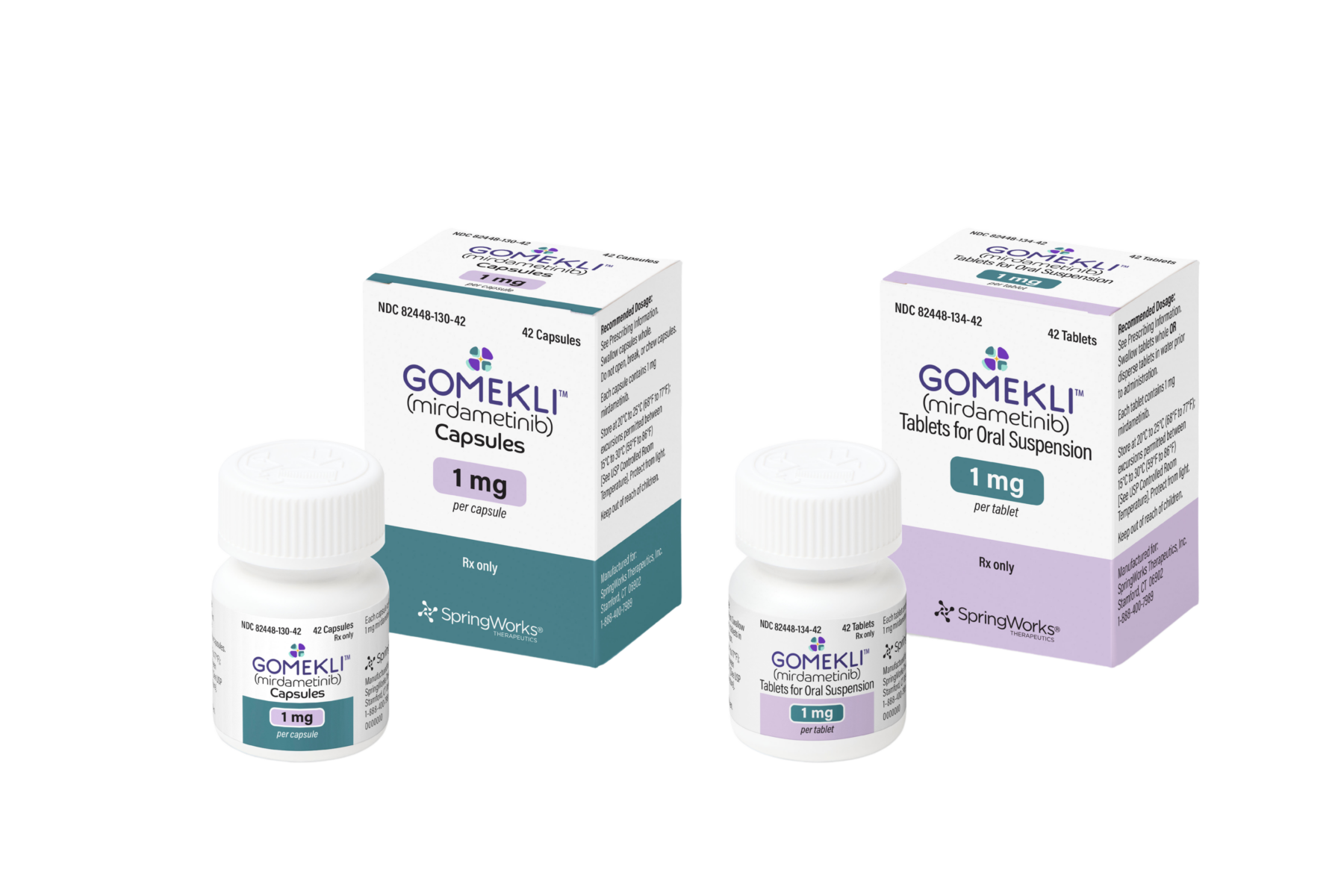
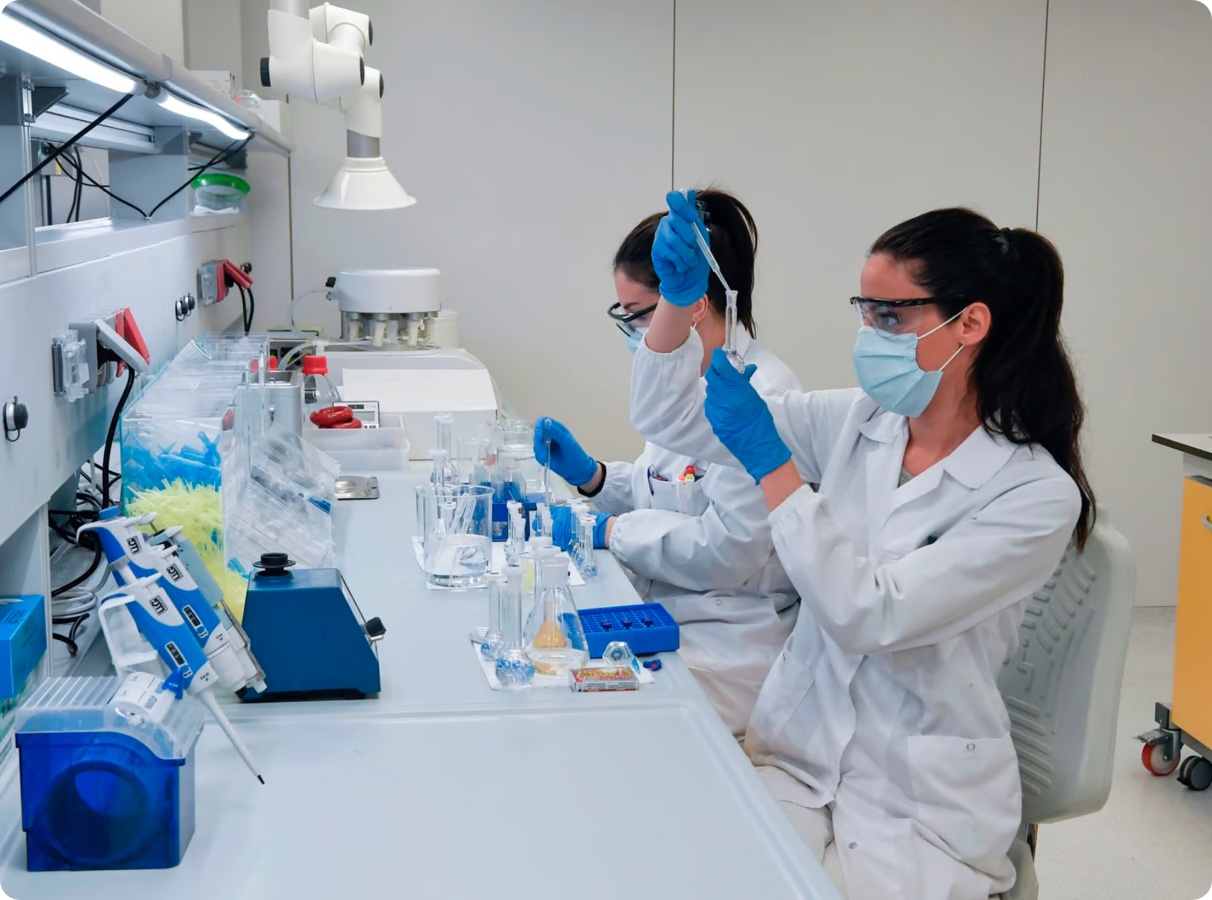
Brigatinib
A landmark study published in the New England Journal of Medicine revealed promising results for the use of brigatinib in treating NF2-related schwannomatosis (NF2-SWN). This breakthrough is a direct outcome of the Synodos for NF2 research initiative spearheaded by the Children’s Tumor Foundation, highlighting the power of collaborative research. A multi-institutional global research team, established and funded by CTF, found promising evidence that brigatinib can help shrink the tumors of patients with NF2-related schwannomatosis. Find out the key takeaways of the study.
Awareness Month
The media has also played a role in raising awareness about NF.. For instance, May is NF Awareness Month, during which various campaigns and events are held to educate the public and support research efforts. High-profile figures and celebrities have also contributed to the cause, sharing their personal stories and helping to destigmatize the condition. By raising awareness and understanding, we can foster a more inclusive and supportive society for individuals with neurofibromatosis.
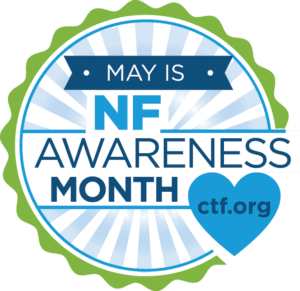
Latest News

Announcing the Winners of the 2025 “I Know a Fighter” Photo Contest!

Sign Up for our Newsletter
Join our mailing list for news, exclusive resources, events and opportunities.
"*" indicates required fields



